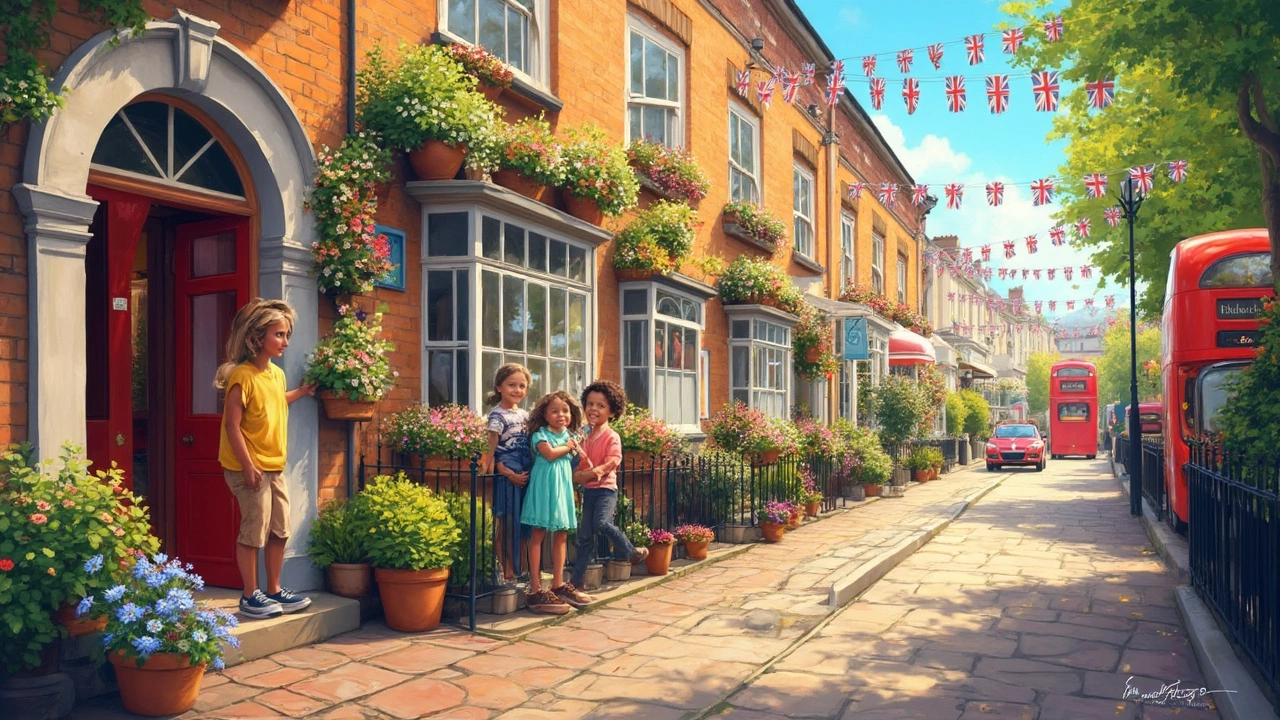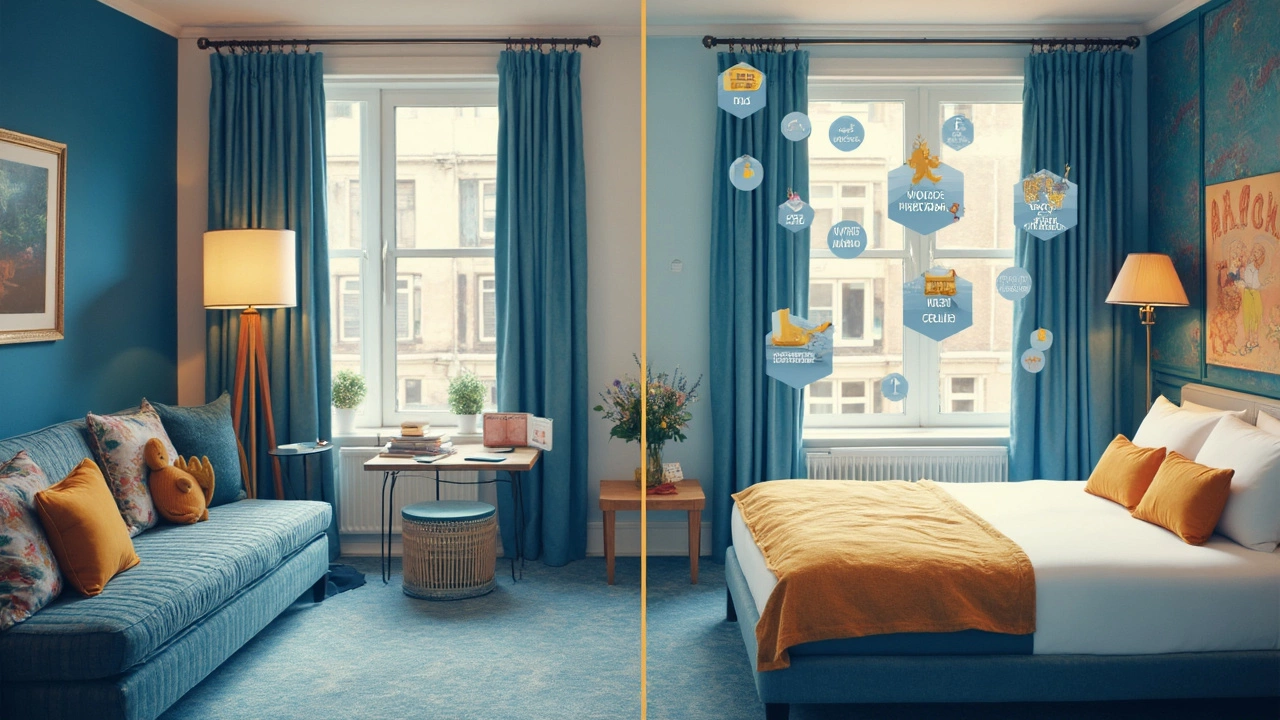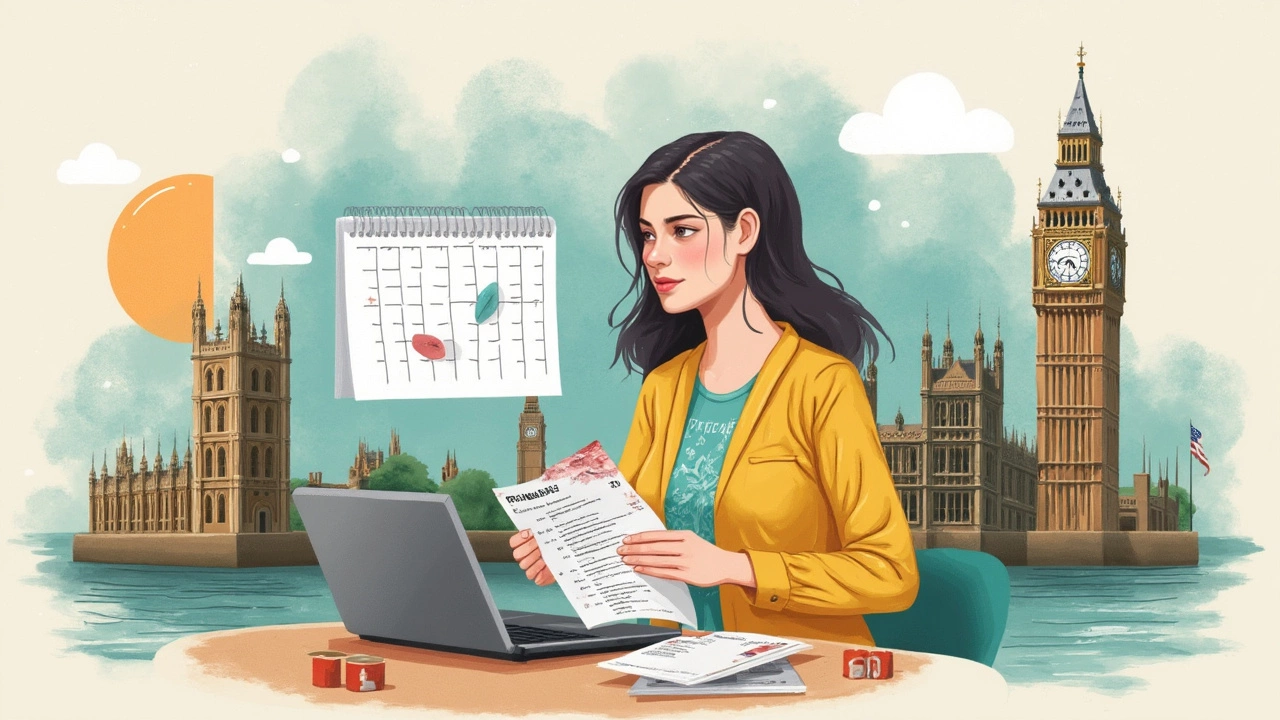Airbnb UK: Is It Worth Doing for Your Next Staycation?
 Jun, 6 2025
Jun, 6 2025
Airbnb isn’t just for backpackers in Bali or fancy London penthouses anymore—these days, it’s all over the UK, from tiny Scottish loch cabins to classic seaside homes in Cornwall. So is it worth picking an Airbnb over a hotel or B&B for your UK staycation?
If you’re hoping for more space, a kitchen to whip up your own food, or just something that feels a bit more 'yours' than a standard room, Airbnb can hit the spot. But there’s a lot more going on behind the booking button. Prices might look low at first, then suddenly jump with cleaning and service fees. Nobody likes surprise costs, right?
On the other hand, Airbnb gives you options that hotels can’t—want a houseboat in Bristol or a converted barn in Yorkshire? No problem. But you’ll want to keep your eyes out for things like cancellation rules (some are super strict) and what the local council’s saying about short-term lets, especially in hot spots like Edinburgh and London. There are actual caps on the number of nights you can host in some places.
- What Makes Airbnb Different in the UK?
- How Much Does Airbnb Actually Cost?
- Airbnb Pros and Cons You Should Know
- Local Laws, Rules, and Surprises
- Tips for a Smart UK Airbnb Stay
What Makes Airbnb Different in the UK?
In the UK, the Airbnb scene is its own beast. Most bookings aren’t in city skyscrapers—the average UK listing is a whole home or a quirky cottage, not just a spare room. About 75% of hosts in the UK rent out their entire place, which often means more privacy compared to many other countries where room-sharing is common. The vibe is less “crash on someone’s couch,” more “have your own front door on a British street.”
One thing people notice right away? Location variety. You’ll find Airbnbs in spots where hotels literally don’t exist—from farm stays in Kent to shepherd’s huts in the Lake District. During the staycation boom in 2020, Airbnb said UK guests booked properties in over 9,000 different towns and villages, which just doesn’t happen with hotels and B&Bs.
Pricing quirks are another clear difference. UK hosts set their own cleaning and service fees, so the “nightly rate” can be pretty far from what you actually pay. Always check the total before you book. Last summer, the average total cost for a two-bed Airbnb outside London was £145 per night, compared to £120 for budget hotels, but with a much bigger range of amenities.
Security, reviews, and rules in the UK have some extra twists compared to other countries. Many hosts now use "Enhanced Cleaning" protocols that follow NHS guidelines—important if you care about a proper scrub down after the last guest.
“Since the pandemic, UK travellers are looking for private spaces where they can control their own environment. Airbnb offers flexibility, but you should always read the fine print and ask questions before you book,” — Anna Wills, travel editor at The Independent.
If you’re curious how Airbnb stacks up to other options, check out this quick side-by-side:
| Airbnb UK | Traditional Hotel | |
|---|---|---|
| Type of space | Whole home, flat, unique stays | Private room |
| Location spread | Urban, rural, even islands | Mainly urban/touristy spots |
| Kitchen access | Yes (most properly equipped) | Rarely |
| Average price (2 bed, summer 2024) | £145/night | £120/night |
| Cleaning/service fees | Yes, varies by host | Usually included |
So, if you’re looking for an experience that actually feels local, want something different than a run-of-the-mill hotel, or need space for a group, Airbnb UK can be a total game changer.
How Much Does Airbnb Actually Cost?
At first glance, Airbnb seems like a bargain—until all the add-ons stack up. UK listings in 2025 show everything from rooms for £35 a night to castles costing well over £700 per night, but the final number isn’t just about the nightly rate.
Here’s what usually makes up your total bill:
- Nightly rate: This is what hosts advertise upfront. It varies a ton by location, size, time of year, and even weekends versus weekdays.
- Cleaning fee: Some hosts charge £10-£120 extra just for cleaning. This can make cheap places suddenly not-so-cheap.
- Service fee: Airbnb usually adds 14-16% of your subtotal as a service fee, covering platform costs.
- Additional guest fees: Need an airbed or extra person staying over? Hosts might bump up the cost per person after two guests.
- Local taxes: Some cities like London started adding a 'Tourist Tax' per night, shown clearly at booking if it applies.
To show you how it all adds up, here’s a quick look at what a typical two-night family stay in three popular places might cost:
| Location | Base Rate | Cleaning Fee | Service Fee | Total (2 nights) |
|---|---|---|---|---|
| Edinburgh city flat | £110/night | £45 | £38 | £303 |
| Cornwall seaside cottage | £90/night | £30 | £28 | £238 |
| Manchester apartment | £75/night | £20 | £22 | £192 |
Notice how fees can take what looks like a cheap option and make it pricier than a hotel? Before you click 'Book,' always check the final price breakdown. Last-minute stays and holidays (like during half-term or music festivals) see prices shoot up, so it pays to book early and compare.
If you travel outside city centers or off-season, you usually snag the best value. And if your plans are flexible, try mid-week—it’s almost always cheaper. For bigger groups, splitting costs in an Airbnb often beats booking several hotel rooms, making it the go-to for family getaways or friend trips.
Bottom line: with a *strong* eye on all the add-ons, Airbnb UK can save you money compared to hotels, but watch out for those sneaky extras.

Airbnb Pros and Cons You Should Know
There’s a bunch of reasons people pick Airbnb UK for their staycations, but it’s definitely not all smooth sailing. Let’s break down the big perks—as well as the headaches you might run into—so you can decide what actually suits your trip.
- Huge variety: You’re not just stuck with boring hotel rooms. Flats, cottages, treehouses, even narrowboats are up for grabs. This makes it easier if you’re traveling as a family or group and want your own space.
- Local feel and flexibility: Airbnbs often give you a slice of real neighbourhood life. You get kitchens, washing machines, sometimes a garden—making longer stays or trips with kids way more relaxed.
- Competitive prices... sometimes: You might pay less for a whole flat than a hotel room, especially in smaller towns or during off-peak months. But watch the extra fees—they can sneak up fast.
- Personal touch: Many hosts leave helpful guides about the neighbourhood, best cafes, or even free biscuits in the kitchen. It can feel a lot homier than a chain hotel.
But it’s not all sunshine. Here’s what you should watch out for when booking with Airbnb UK:
- Extra fees: Cleaning fees and Airbnb’s service fee can easily add £50–£200 to your bill, depending on the property size and location.
- Cancellation rules: Some listings are super strict. If your plans change, you might not get your money back at all.
- Quality gamble: Photos can be old, reviews can be misleading, and not all hosts keep their properties spotless. There’s no front desk to complain to—if WiFi is down or the place smells funny, it’s on you to sort it out with the host.
- Community backlash: In places like Edinburgh and touristy spots in Cornwall, locals aren’t thrilled about houses disappearing to Airbnbs instead of being homes for locals. This pressure has led to new local laws and restrictions (like in Greater London where short lets are capped at 90 nights per year).
On average, here’s how the costs stack up if you compare a typical Airbnb to a hotel in the UK, as of early 2025:
| Type | Nightly Price | Cleaning Fees | Average Service Fees |
|---|---|---|---|
| Airbnb (2-bed, city centre) | £110 | £30 | £20 |
| Mid-range hotel | £125 | Included | — |
So, if you’re sharp about fees and check reviews carefully, Airbnb can totally work for a UK trip. Just know it’s not always the cheapest or easiest pick, especially when flexibility and reliability matter.
Local Laws, Rules, and Surprises
When you book or host on Airbnb UK, you’ll quickly notice there’s a lot more red tape than you’d expect. In London, there's an actual law that limits you to renting your place for no more than 90 nights per year unless you have special planning permission. If you go over that, Airbnb will automatically block your calendar, which has tripped up tons of would-be hosts.
Heading north to Scotland, there are even tougher rules. Since October 2023, hosts need a licence from the local council before listing any property, even a spare room. They're picky about paperwork, and hosts have to show proof of things like fire safety and insurance. For city hotspots like Edinburgh, there are extra restrictions—some neighborhoods barely allow any new short-term lets at all, trying to free up housing for locals.
Wales and Northern Ireland aren't as strict—yet. But councils still have the power to control things if noise complaints get out of hand or if a property is clearly just a non-stop party pad. Even regular folks booking need to keep an eye out for 'house rules.' Most UK Airbnbs ban parties, smoking indoors, or even pets. Get caught breaking these and you could be booted out early—no refund.
- Always check the cancellation policy before you book. Some owners use "flexible," but others are extremely "strict." Changes or refunds can be tough.
- Read the local rules if you're staying anywhere near a big city. London, Edinburgh, and Bath are especially tricky for short-term lets.
- Watch for surprise fees in cleaning, service, or even "tourist taxes"—especially in city centres and seaside towns.
- If you're hosting, make sure your mortgage or lease allows short-term letting. Some banks don’t like it and can even threaten to pull your mortgage if you’re caught.
The biggest surprise? One in three UK Airbnbs now uses a lockbox or self-check-in, so you might never even meet your host. Handy if you arrive late, but don’t expect the old-school B&B welcome.

Tips for a Smart UK Airbnb Stay
Booking a place on Airbnb UK can save you a headache or two (and maybe some cash), but only if you play it smart. Here are the practical things nobody tells you until it’s too late.
- Check Location Details Twice: Some listings fudge things a bit. Want to be “close” to the city centre? Zoom out on the map, search local bus times, and Google the exact postcode. In London, a '15-minute train ride' can turn into an hour if you’re not careful.
- Read Every Recent Review (Yes, All of Them): The last six months’ reviews are gold. Look for mentions of dodgy heating, noisy neighbours, or showers with a mind of their own. If loads of people complain about the WiFi, it’s not a one-off.
- Ask About Parking or Local Permits: Some city-centre spots need a resident permit or have no free parking at all. Hosts usually know the deal—just ask before you book and avoid a parking ticket.
- Watch Out for Cleaning and Service Fees: A place that’s £70 a night on the listing might end up £110 with cleaning and Airbnb's service charge tacked on. Always hit 'Book' all the way to nearly the end for a real price before committing. Especially in hotspots like Bath, Edinburgh, and Brighton where fees are often highest.
- Double-Check House Rules: In the UK, some Airbnbs have rules about no shoes, recycling, or not lighting candles. Make sure you’re OK with the rules before you lock your money in. Some hosts will charge for breaking them.
Extra tip: During bank holidays and the summer, places fill up fast and prices jump. Book at least two months ahead—sometimes you’ll save over 30% compared to last-minute rates, especially on the coast or in the Cotswolds.
If you want peace of mind, use Airbnb’s filter for 'Superhost'—these folks are rated at least 4.8 out of 5 and respond fast. Last thing: if your plans might change, pay the small extra for a flexible cancellation policy. It’s usually worth it.
